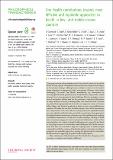One Health contributions towards more effective and equitable approaches to health in low- and middle-income countries

View/
Date
2017Author
Cleaveland, Sarah
Sharp, Jo
Abela-Ridder, Bernadette
Allan, Kathryn
Buza, Joram
Crump, John
Davis, Adrian
Del Rio Vilas, Victor
de Glanville, William
Kazwala, Rudovick
Kibona, Tito
Lankester, Felix
Lugelo, Ahmed
Mmbaga, Blandina
Rubach, Matthew
Swai, Senyael
Waldman, Linda
Haydon, Daniel
Hampson, Katie
Halliday, Jo
Metadata
Show full item recordAbstract
Emerging zoonoses with pandemic potential are a stated priority for the global
health security agenda, but endemic zoonoses also have a major societal impact
in low-resource settings. Although many endemic zoonoses can be treated,
timely diagnosis and appropriate clinical management of human cases is often
challenging. Preventive ‘One Health’ interventions, e.g. interventions in
animal populations that generate human health benefits, may provide a useful
approach to overcoming some of these challenges. Effective strategies, such as
animal vaccination, already exist for the prevention, control and elimination
of many endemic zoonoses, including rabies, and several livestock zoonoses
(e.g. brucellosis, leptospirosis, Q fever) that are important causes of human
febrile illness and livestock productivity losses in low- and middle-income
countries. We make the case that, for these diseases, One Health interventions
have the potential to be more effective and generate more equitable benefits
for human health and livelihoods, particularly in rural areas, than approaches
that rely exclusively on treatment of human cases.We hypothesize that applying
One Health interventions to tackle these health challenges will help to build
trust, community engagement and cross-sectoral collaboration, which will in
turn strengthen the capacity of fragile health systems to respond to the threat
of emerging zoonoses and other future health challenges. One Health interventions
thus have the potential to align the ongoing needs of disadvantaged
communities with the concerns of the broader global community, providing a
pragmatic and equitable approach to meeting the global goals for sustainable
development and supporting the global health security agenda.
This article is part of the themed issue ‘One Health for a changing world:
zoonoses, ecosystems and human well-being’.
